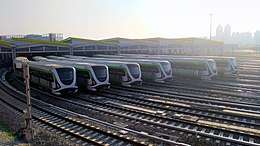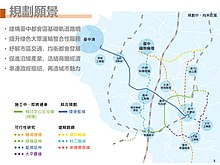Taichung Metro
The Taichung Metro (also called Taichung Mass Rail Transit or Taichung MRT) is a rapid transit system currently being constructed by the city government of Taichung, Taiwan. In addition to Taichung, it may serve Changhua and Nantou counties. Some of the names of the stops in the Taichung Metro are derived from Tongyong Pinyin.[1]
 | |
 Trains at Beitun Depot | |
| Overview | |
|---|---|
| Locale | Taichung and Changhua |
| Transit type | Rapid transit |
| Operation | |
| Operation will start | 2020 |
| Operator(s) | Taichung Mass Rapid Transit System Co. |
| Technical | |
| System length | 31.8 km (19.8 mi) |
| Track gauge | 1,435 mm (4 ft 8 1⁄2 in) |
| Taichung Metro | |||||||||||||||||
|---|---|---|---|---|---|---|---|---|---|---|---|---|---|---|---|---|---|
| Traditional Chinese | 臺中捷運 | ||||||||||||||||
| |||||||||||||||||
| Taichung MRT | |||||||||||||||||
| Traditional Chinese | 臺中都會區大眾捷運系統 | ||||||||||||||||
| |||||||||||||||||
History
Planning of the Taichung MRT started in 1990 with a study conducted by the Taiwanese Bureau of Housing and Urban Development.[2] The study was completed in 1998 and suggested the implementation of three routes (Red, Green, and Blue). The project was formally approved by the Executive Yuan of the ROC government on 23 November 2004. The city government signed a joint development contract with the Taipei City Government on 12 December 2007.[3]
Meanwhile, the Taichung City Government started their own planning of more lines and decided that the much cheaper BRT system would be the future of mass transit in Taichung. Since the corridor of the originally proposed Red Line is partially served by the TRA mass transit construction, the Blue Line corridor was chosen as a first step to implement BRT in Taichung.
Construction of the first line, the Green Line, had been paid for and was expected to begin in October 2007, though it was pushed back and started construction on 8 October 2009.[4] The 16.7 km (10.4 mi) section of the Green Line is now scheduled for completion by 2020 and will include 18 stations.
On March 9, 2011, Kawasaki Heavy Industries announced that it had won a joint order with Alstom Transport SA (France) and CTCI Corp. (Taiwan) to supply 36 units consisting of two-car, driverless trains totaling 29.5 billion yen.[5] While Kawasaki will oversee construction, Alstom will focus on signaling and CTCI will supply the electrical system.[5]
Proposed network

Green Line
The MRT Green Line Wuri - Beitun is currently being constructed as an elevated railway with driverless electric trains. It will be about 16.5 km (10.3 mi) long. Original plans included 15 stations and a depot, but because of pressure from the Taichung City Government the station count was increased to 18. It will stretch from Songzhu Road in Beitun District of Taichung along Beitun Road, Wenxin Road, and Wenxin South Road to the High Speed Rail Station in the Wuri District.[6] It is expected to cost NT$53,491,000,000, and will be built by the Taipei City Department of Rapid Transit Systems.[7]
Test runs are anticipated by late 2018 and formal operations by 2020.[8] The line passes through Nantun and Xitun districts. The planned total cost for the project is NT$51.39 billion (including land acquisition costs), which is split between the local and central government.[2]
| Line | Mode | Terminus | km | Total km | Status | ||
|---|---|---|---|---|---|---|---|
| G Green Line | Wurih-Wunsin-Beitun Line | MRT | Beitun Main - Taichung HSR Station | 16.7 | 24.7 | Under construction | |
| Changhua Extension | Taichung HSR Station - Changmei Road | 5.53 | Planned | ||||
| Dakeng Extension | Jioushe - Yuanshan New Village | 2.49 | Planned | ||||
| B Blue Line | MRT | Taichung Harbor - Taiping | 29.5 | 29.5 | Planned | ||
| O Orange Line | BRT | Zhongqing - Provincial Advisory Council | 25 | 25 | Cancelled[9] | ||
| MRT | Taichung Airport - Wufeng | 29.27 | 29.27 | Cancelled[9] | |||
| LRT | Taichung Airport - Wufeng | 25 | 25 | Planned[9] | |||
Blue Line
The Taichung City Government cites LRT being five times cheaper to build than MRT, and BRT in turn being five times cheaper than LRT. For this reason, the first MRT line in Taichung is being built as an elevated line (as opposed to underground), and future lines are planned to be built as BRT with the possibility of later upgrading to grade-separated modes of transit. The system began its operation in 2014, between Providence University and the Taichung Railway Station. It ran along the busy Taiwan Boulevard, on a designated lane made specifically for BRT. Bus stations were built on the divider between the fast and slow lanes on the road. It was the first articulated bus system in Taiwan. The service ended on 8 July 2015 due to the new policy announced by Mayor Lin Chia-lung on 30 March 2015. The designated BRT Lane was changed to an ordinary bus lane, allowing other buses that operate primarily on Taiwan Boulevard to use the lane. The articulated buses that originally ran the route became known as bus route 300. Currently it is a designated bus lane for multiple routes. A MRT system running the same route is currently being planned.
Orange Line
A fourth line was planned in 2009 to connect the city with Taichung Airport. However, after multiple proposals to build a MRT and BRT line were rejected by the Ministry of Transportation and Communications, the city government turned to an LRT system. The system is still being planned.[10]
See also
- Rail transport in Taiwan
- Transport in Taiwan
References
- 喻文玟 (15 June 2019). 漢語拼音vs.通用拼音 中市捷運、街道不同調. 聯合新聞網 (in Chinese). Retrieved 28 July 2019.
台中捷運綠線明年底通車,目前18站有命名爭議,捷運迷也發現,車站名稱的英文拼音「一市兩制」,台中的道路採「漢語拼音」,捷運站是用「通用拼音」,以主要幹道文心路為例,路牌是漢語拼音「wenxin」;捷運站是通用拼音「wunsin」。
- "Taichung Metropolitan MRT System Wuri-Wenxin-Beitun Line Construction Project". Department of High Speed Rail, MOTC. Retrieved 2011-01-06.
- "Taipei and Taichung signed a contract for the cooperation of the Taichung MRT development project(2007-12-12)". Taichung City Government. 2007-12-12. Retrieved 2011-01-19.
- "Taichung MRT System Breaks Ground". China Economics News Service. 2008-10-08. Archived from the original on 2011-07-24. Retrieved 2011-01-19.
- "Kawasaki Heavy, Others Snag Taiwan Order For Train System". Nikkei. 2011-03-10. Retrieved 2011-03-09.
- "Taipei, Taichung City & the Department of Transportation jump start the Taichung MRT". Compass Magazine. December 2008. Retrieved 2011-01-19.
- "臺中都會區捷運系統- 烏日文心北屯線暨場、站聯合開發". Department of Rapid Transit Systems. 2008-11-01. Retrieved 2010-06-19.
- "Taichung MRT Green Line enters systems integration stage". Taiwan Focus. Retrieved 4 March 2018.
- "等了3個月…台中大眾運輸網洗牌". United Daily News. 2015-03-24. Retrieved 2015-04-21.
- "林佳龍:捷運橘線被退 才啟動輕軌捷運路網 - 政治 - 自由時報電子報". Retrieved 2016-07-27.
External links
- Taichung MRT Official Website (in Chinese)
- Taichung MRT Official Facebook (in Chinese)
- Rapid Transit System Office of Taichung City (in English)
- Rapid Transit System Office of Taichung City (in Chinese)
| Wikimedia Commons has media related to Taichung MRT. |